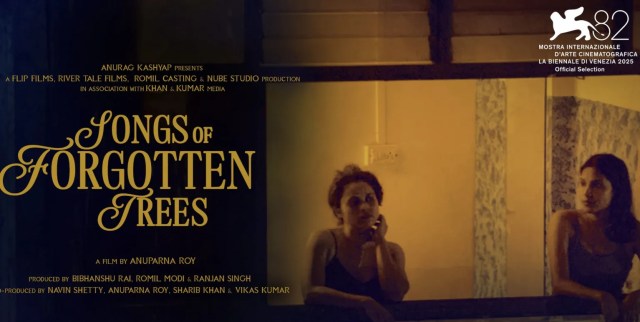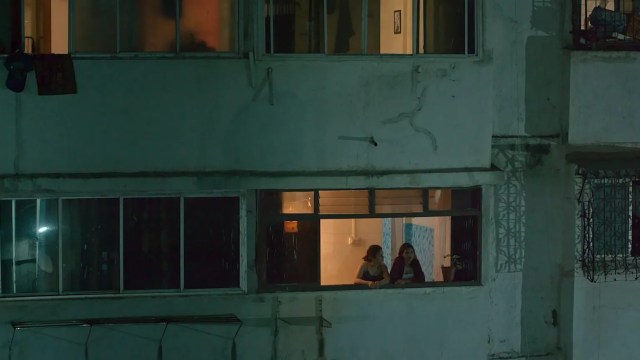By deepika lama
September 21, 2025|VENICE, Italy –
In a big moment for Indian cinema, young director Anuparna Roy has become the first Indian to win the Best Director award in the Orizzonti section at the Venice Film Festival. Her debut film, Songs of Forgotten Trees, took home the prize at the 82nd edition of the event, which wrapped up earlier this month. At just 27 years old, Roy’s win shows how fresh voices from far-off places can shine on the world stage.

The Orizzonti category, also called Horizons, focuses on new trends in films. It highlights debut works, young talents, indie stories, and lesser-known movies that pack a punch. Out of 4,580 entries, only 21 made the main competition. Roy’s film was the only Indian one in Orizzonti, making her victory even sweeter. 42 8 When she got the award, Roy stood on stage shaking with joy and tears in her eyes. “This is for the women who fight every day to be seen,” she said in her speech. The award was handed to her by a jury led by French director Julia Ducournau, a Palme d’Or winner.
Roy comes from a simple village called Narayanpur in Purulia district, West Bengal. It’s a rural spot far from big cities like Kolkata or Mumbai, full of fields, ponds, and hard work. Her dad, Brahmananda Roy, is a retired coal mine officer. Her mom, Manisha Roy, runs the home. Growing up, Roy saw poverty up close. Men in lungis worked rice fields at dawn. Women bathed in ponds. Kids from poor families, like Dalits, faced tough rules. Girls got married young instead of books to read.
Her name was even picked by famous Bengali director Ritwik Ghatak, a family friend. But her path to films was not easy. After school at Ranipur Colliery High and Napara High, she got a degree in English literature from Kulti College under Burdwan University. Then she studied mass communications. Like many from small towns, she took a safe job in a call center in Delhi to escape marriage pressure and earn money.
One day in Delhi, Roy met film students by chance. That sparked her love for movies. She saved every rupee from six years of selling IT software. In 2023, she made her first short film, Run to the River, all on her own. It tells a sad story of a girl and a widow in old British Bengal, touching on poverty and lost innocence. 15 18 She moved to Mumbai, joined acting classes at Anupam Kher’s school, and worked as an assistant director. Her family was upset at first. Her mom thought she’d get a government job. Dad said they didn’t see her film passion in school days. But now, after the win, they are proud. “We couldn’t believe it when she called from Italy,” her dad said.

To make Songs of Forgotten Trees, Roy went bold. At a party, she met producer Ranjan Singh from Flip Films. She asked straight: “Sir, will you make a third-world film?” He was shocked but met her next day. She pitched in under 10 minutes, but they talked for hours. He said yes soon after. 10 15 Roy is a big fan of Anurag Kashyap’s Gangs of Wasseypur. She pushed Singh to show her script to him. Kashyap loved it and became the presenter. Other producers like Bibhanshu Rai and Romil Modi helped with funds when times got tough.
The film runs 77 minutes. It’s shot all in Roy’s own Mumbai apartment. The two lead actresses, Naaz Shaikh as Thooya and Sumi Baghel as Swetha, even lived there during shooting to feel real. No fancy rules – no long, mid, or close shots. Just long takes to catch daily life like it is. Supporting roles go to Bhushan Shimpi, Ravi Maan, Pritam Pilania, and Lovely Singh.
What’s the story? In busy Mumbai, Thooya is a dreamer from the northeast. She wants to act but works as an escort to pay bills. She lives in a nice flat owned by her rich friend – a sugar daddy. She rents a room to Swetha, a new migrant with a call center job. At first, they ignore each other. One is loud and tough, the other quiet and polite. But slowly, they connect. Shared looks, small helps, silent chats. They face city loneliness, bad clients, and old pains. Their bond grows into something deep – maybe love, maybe sisterhood – in a world that pushes women aside.
The title nods to Hollong trees in Assam and Arunachal Pradesh – tall, forgotten giants that sway in winds. Roy mixes city noise with rural songs for poetry. Flashbacks show Thooya’s lost friend Jhumpa, married at 12 from the Dalit group. That’s real – based on Roy’s childhood pal Jhuma Nath, wed at 13 under a bad government plan. She vanished, leaving silence that hurts Roy still. Other bits come from Roy’s grandma and her stepdaughter’s close, quiet tie. “The personal is political,” Roy says. “Jhuma’s wedding wasn’t just family – it was government pushing Dalits to marry, not learn. I got rice by weight as a girl, boys got books. That’s politics.”

Critics love it. The Hollywood Reporter calls it “a clear-eyed, restrained, moving story of two young women finding solace.” It shows women’s survival in a tough city. 27 Variety praises how fiction protects real lives while keeping truth. 3 Observer says Roy’s style is “melodic and understated,” digging drama from hidden spots. 33 ICS Film sees it as a “meditation on urban loneliness,” full of unspoken gestures. 0 Some say it’s too quiet or short, but most agree it’s tender and real.
This win breaks ground for Indian women in global films. Bengal gave us stars like Satyajit Ray, Ritwik Ghatak, and Mrinal Sen. But Roy grew up far from their city lights, without fancy training. Past Indian entries at Venice include Stolen by Karan Tejpal and Court by Chaitanya Tamhane, but no Orizzonti Best Director for India till now. Venice started in 1932. It grew big in the 1950s with Asian films, including Indian ones. Now, Roy joins a line of bold women directors, like Payal Kapadia, whose All We Imagine as Light won big at Cannes.

At the awards, Roy wore a handloom saree mixing Purulia patterns with Palestinian flag colors. She spoke for Gaza kids: “I will use my voice for what makes us uncomfortable.” Social media had some backlash, but she stands firm. 2 15 “Poverty shaped me. I make films for those lives,” she told BBC.
What’s next? A sequel and maybe prequel to Songs. Scripts are in works. But no big commercial flicks. “No sugar-coated cinema for me,” Roy says. “I must show the real world, even if it upsets.” 2 11 16 Her story inspires girls in villages: Dream big, save pennies, chase passions. As India eyes more global spots, Roy proves home truths travel far.
The Venice fest also gave Golden Lion to Jim Jarmusch’s Father Mother Sister Brother. Silver Lion went to The Voice of Hind Rajab on Gaza. Other wins: Best Actress to Benedetta Porcaroli, Best Actor to Giacomo Covi. 37 40 Stars like George Clooney, Julia Roberts, and Kardashians added glamour.
Roy’s rise from call center to canals of Venice reminds us: Great stories start small. Her film whispers of bonds in chaos – a tune for our times.
